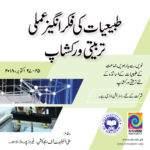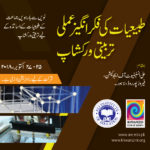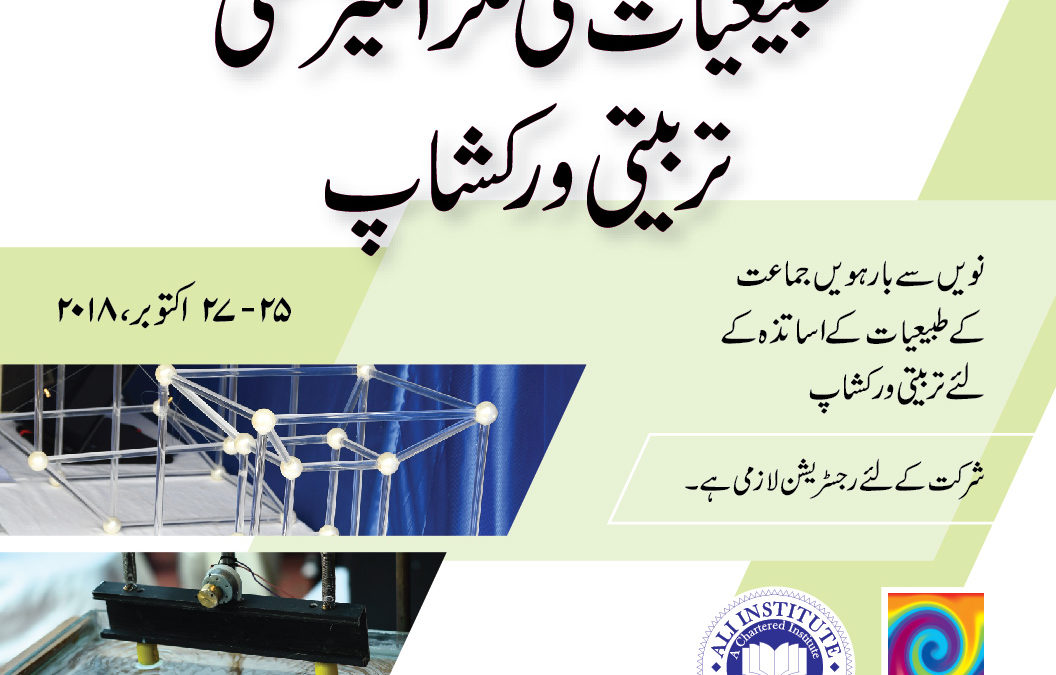| Thought-provoking Physics Practicals Phase I First Teacher Training Workshop |
|---|
 , ,  Sponsors and Collaborators: Ali Institute of Education Registration: Registration is required. Date: October 25, 2018 October 26, 2018 October 27, 2018 Time: 10 am to 4 pm, 10 am to 4 pm, 10 am to 4 pm Venue: Ali Institute of Education, Ferozepur Road, Lahore Abstract: Khwarizmi Science Society (KSS) and Ali Institute of Education (AIE) have initiated a joint Teacher Training Program, فکر انگیز سائنسی تعلیم Thought-provoking Science Education. In the first phase of the program, we will focus on teaching of practical physics through thought-provoking, innovative and exciting physics experiments. The program comprises of three independent interactive workshops, the first of which will take place on 25th to 27th October, 2018 at the Ali Institute of Education, Ferozepur Road, Lahore. The purpose of this workshop is to enable physics teachers to learn about the culture of modern physics experimentation preparing them to design and deliver modern, exciting and insightful physics experiments to their students. By the end of the workshop, the participants will be able to get exposure to
The hand-picked experiments to be offered in this workshop are designed based on topics selected from the syllabi of Grades 9 to 12 (matric to intermediate) and O levels. These four-five experiments will not be a replica of experiments traditionally performed by students in our laboratories, rather they are thought-inspiring experiments designed to highlight how physics practicals, in our opinion, should be conducted in an enabling, skills-oriented and contemporary fashion. All experiments will be low-cost and will become fodder for ideas for teachers who could recreate their own experiments to amplify physics topics in their textbooks. Coverage areas: The coverage of these experiments will be from mechanics, optics, heat, electromagnetism and waves. Laboratory skills: measurement, uncertainties, graphing, data processing, using the camera and the smartphone for physics experiments, building hardware, connecting theory with experiment, interpreting experimental results. We are pleased to invite you to participate in the workshop. If you teach physics, especially practical physics, conduct laboratory training for your students, want to set up new labs, are motivated about physics education and would like to usher in radical reforms to how physics is taught in your school, or are a headmaster or headmistress and would like to nominate some talented individual from your school or college, please fill out the registration form. Registration is required to participate in the workshop. Once the registration form is filled, the participants will be selected and shortlisted on basis of their willingness to learn, background and inclination towards practical aspects of teaching. Further details are provided below:
We look forward to your nominations or registrations. For further queries: Map:
Resource Persons:
Supplementary Documents:
Report of First Teacher Training Workshop
Energy Momentum Transfer
Ohms Law
Projectile Motion
Understanding Energy Transfer
RadiationInstructor, Trainer Umar Hasan Member- Khwarizmi Science Society Instructor, Trainer Aamna Saleem Member- Khwarizmi Science Society Instructor, Trainer Khadim Mehmood Member- Khwarizmi Science Society |
From Space Missions to Space Explorations »

